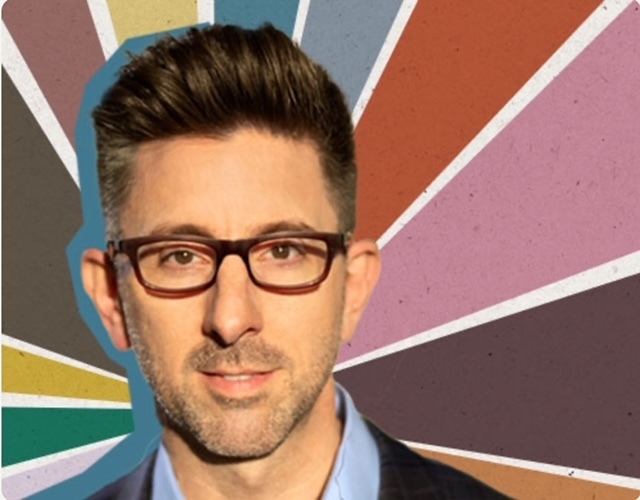
One of the many podcasts that inspired me to immediately buy the book was Marc Brackett's Permission to Feel on Brene Brown's Unlocking Us Podcast. This conversation, and the book itself, offers such an accessible and insightful understanding of emotions. I love the concept of being an "emotion scientist"—someone who approaches their own and others' feelings with curiosity rather than judgment. This perspective makes reflecting on experiences and interactions far less stressful and more constructive.
Marc has also expanded my emotional vocabulary. Most people default to labeling their emotions as sad, mad, or happy. But the book cover features a wide range of words to describe feelings, grouped into color categories—yellow, red, blue, and green. Now, when talking to my kids, I try to use a broader spectrum of words to help them, and myself, better understand their emotions. For instance, when they cry, we don't just talk about feeling sad; we explore whether they might be frustrated, disappointed, or perhaps feeling left out. Imagine how much richer our conversations could be if we all approached emotions with curiosity and had the language to express them fully.
Happy listening, and reading! Enjoy the summary of the podcast conversation below!
Navigating the Emotional Landscape: A Conversation Between Marc Brackett and Brené Brown
In an insightful and candid conversation between Marc Brackett, Director of the Yale Center for Emotional Intelligence, and renowned researcher Brené Brown, they explore the complexities of understanding and regulating emotions. The dialogue, deeply rooted in Brackett's RULER framework, highlights the critical role of emotional intelligence in fostering personal and professional well-being.
Recognizing and Understanding Emotions
The discussion begins with a focus on recognizing and labeling emotions. Brackett emphasizes that many people struggle to accurately identify their feelings, often confusing external behaviors with internal emotions. For instance, anger might mask underlying feelings of shame or disappointment. Understanding the true source of our emotions is crucial for addressing them effectively. Brackett also underscores the significance of labeling emotions accurately, as it lays the foundation for emotional regulation and guides our responses in various situations.
The Role of Curiosity and Emotional Science
Brown raises the importance of curiosity in understanding emotions, noting that some people are naturally more inquisitive about their own and others' emotional states. Brackett agrees, contrasting the approach of an "emotion scientist" with that of an "emotion judge." An emotion scientist seeks to understand the underlying causes of emotions, while an emotion judge may make snap judgments without fully exploring the emotional landscape.
Barriers to Emotional Expression
A significant portion of the conversation delves into the barriers that prevent people from expressing their emotions. Cultural, racial, and power dynamics often inhibit open emotional expression. Brackett shares personal experiences from his work, illustrating how power imbalances can stifle emotional honesty even in environments designed to encourage it. Both speakers agree that creating spaces where people feel safe to express their true feelings is essential for building authentic relationships.
Emotion Regulation: Strategies and Challenges
The conversation shifts to the topic of emotion regulation, which Brackett describes as the most crucial yet challenging aspect of emotional intelligence. Effective emotion regulation involves not just suppressing or ignoring emotions but understanding and managing them in a way that promotes well-being. Brackett highlights the effort required to regulate emotions and the importance of developing strategies that align with one's personality and context. Brown adds that unfelt emotions do not simply disappear; they can "metastasize," leading to long-term negative effects if not addressed.
Meta-Emotions and the Importance of Self-Reflection
Brackett introduces the concept of meta-emotions, where individuals experience feelings about their feelings. For example, someone might feel ashamed of their anxiety or guilty about their grief. This layering of emotions can complicate the process of emotional regulation. Both Brackett and Brown emphasize the importance of pausing, reflecting, and understanding the stories we tell ourselves about our emotions. This self-awareness is key to breaking negative patterns and developing healthier emotional responses. Brackett explains that this process often involves acknowledging the discomfort that comes with emotions and learning to manage them in a constructive manner, rather than letting them fester or suppressing them.
The Power of Emotional Intelligence
Throughout the conversation, both Brackett and Brown stress that emotional intelligence is not just about understanding others but also about fostering a deeper understanding of oneself. They discuss the societal need to move past emotional suppression and towards a more open, empathetic approach to dealing with feelings. Brackett and Brown emphasize that emotional intelligence involves a continuous effort to not only understand our emotions but also to skillfully navigate them, especially in complex or challenging situations. The ultimate goal, they agree, is to create a society where people feel safe to be their authentic selves, both in their personal lives and in the workplace.
Conclusion: Embracing Emotional Complexity
This conversation serves as a powerful reminder of the complexity of emotions and the importance of emotional intelligence in navigating them. Whether it's in the workplace, at home, or within ourselves, the ability to recognize, understand, and regulate emotions is essential for building meaningful connections and achieving personal well-being. As Brackett and Brown eloquently discuss, emotional intelligence is not just a skill to be learned but a lifelong journey of self-discovery and growth. Their discussion calls for a shift towards embracing the full spectrum of our emotional experiences, recognizing that our emotional health is integral to our overall well-being.

Jill Saban
Contact Me



